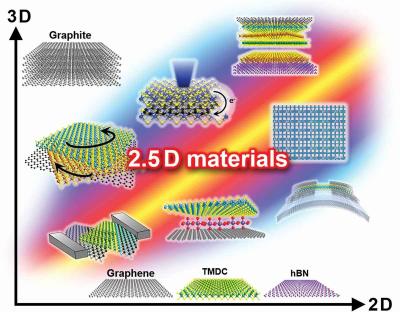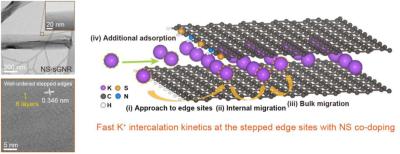
by MBF Admin | May 7, 2022 | 2D materials, Aerospace, AGM, Angstron Materials, Audio, Development, Graphene investing and financials, Investment, Products, Research, Technical / Research
Japan’s Ministry of Education, Culture, Sports, Science and Technology has launched a collaborative project to develop 2.5D materials. The project, titled “Science of 2.5 Dimensional Materials: Paradigm Shift of Materials Science Toward Future Social...
by MBF Admin | Apr 24, 2022 | 2D materials, Aerospace, AGM, Angstron Materials, Audio, Boron Nitride, Development, Investment, Products, Research, Technical / Research
A research team led by the University of Michigan has developed a reliable, scalable method for growing single layers of hexagonal boron nitride on graphene. Graphene-hBN structures can power LEDs that generate deep-UV light, which is impossible in today’s LEDs,...
by MBF Admin | Apr 24, 2022 | 2D materials, Aerospace, AGM, Angstron Materials, Audio, Development, Graphene applications, Investment, Medicine, Membranes, Products, Research, Technical / Research
A team of researchers from TU Delft, led by dr. Farbod Alijani, recently managed to capture the low-level noise of a single bacterium using graphene. Being able to pick up on the miniscule sounds of bacteria can help track if an antibiotics is working, or if the...

by MBF Admin | Apr 15, 2022 | 2D materials, Aerospace, AGM, Angstron Materials, Audio, Carbon Nanotubes, Development, GNRs, Graphene applications, Graphene batteries, Investment, Products, Research, Technical / Research
A research team, led by Professor Yu Seung-ho of the Department of Chemical and Biological Engineering at Korea University, Seoul National University’s Professor Yuanzhe Piao and Sogang University’s Professor Back Seo-in, has fabricate nitrogen and sulfur...
by MBF Admin | Apr 10, 2022 | 2D materials, Aerospace, AGM, Angstron Materials, Audio, Conductors, Development, Graphene applications, Investment, Products, Research, Technical / Research
Researchers from Columbia University, Harvard University, Japan’s National Institute for Materials Science and Austria’s University of Innsbruck have studied the structural and electronic properties of twisted trilayer graphene using low-temperature...
by MBF Admin | Apr 10, 2022 | 2D materials, Aerospace, AGM, Angstron Materials, Audio, Development, Graphene applications, Investment, NGI, Products, Research, Technical / Research
An international research team, led by The University of Manchester’s National Graphene Institute (NGI), has developed a tunable graphene-based platform that allows for fine control over the interaction between light and matter in the terahertz (THz) spectrum,...



